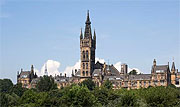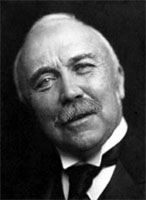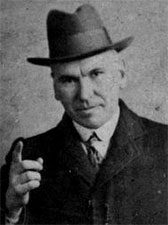Politics and Statesmanship
Achievements
The following achievements are associated with this Theme:
First Minister of Scotland 1999-2000
Donald Dewar, a major player in Scottish and UK politics, campaigned for Scottish devolution and masterminded the Scottish Bill through Westminster, becoming the first holder of the office of First Minister of Scotland.
Founding the Scottish National Party
The Scottish National Party is the largest political party campaigning for the independence of Scotland from the United Kingdom. It has had continuous parliamentary representation since 1967 and was the largest party in the Scottish Parliament since 2007.
Influencing social reform in the 1960s and 1970s
As a champion of causes that were unfashionable in the 1960s and 1970s, Kay Carmichael influenced society's attitudes to gay rights, prison reform, and the decriminalisation of prostitution.
Lasting contribution to Scottish and European politics
Winnie Ewing was one of the most influential Scotswomen of her generation as a Scottish National Party politician who was a Member of Parliament, Member of the European Parliament and Member of the Scottish Parliament.
Lasting significance in political philosophy and strategy
Oliver Franks, described as 'one of the founders of the post-war world', was deeply involved in Britain's recovery after the Second World War and was a co-founder of NATO and chair of the Organisation for European Economic Co-operation.
Leader of the Labour Party 1992-1994
As leader of the Labour Party, John Smith established the principle of "one member one vote" at party conferences and committed Labour to re-establishing a Scottish Parliament.
Leading the Red Clydeside movement
A revolutionary socialist of international standing, John Maclean was an honorary president of the first Congress of Soviets and appointed by Lenin as Bolshevik consul for Scotland.
Leading the Red Clydeside movement
One of the leading orators of his time, James Maxton was one of the prominent figures of the Independent Labour Party (ILP) in Glasgow and a key political figure during the Red Clydeside period.
Legal philosophy
Neil MacCormick was one of the world’s leading philosophers of law and was the constitutional authority behind the upsurge of Scottish nationalism in the late 20th century.
Minister of Pensions and National Insurance 1964-1967
Instrumental in removing the discretionary National Assistance payment scheme and introducing Supplementary Benefit.
Prime minister 1905-1908
As Prime Minister, Sir Henry Campbell-Bannerman introduced legislation to ensure trade unions could not be liable for damages incurred during strike action and to provide free school meals for children.
Prime minister 1922-1923
A leading member of the coalition Government during the First World War, Bonar Law became Prime Minister in 1922 and set about returning Britain to normality.
Secretary of State for Scotland 1936-1938
Walter Elliot had a life-long interest in medical science and was an authority on nutrition. A Conservative with a strong interest in social reform, he introduced free milk for school children.
Secretary of State for Scotland 1941-1945
As Secretary of State for Scotland, Tom Johnston did much to develop the Highlands and attract industry to Scotland, and help set up the North of Scotland Hydro-electric Board.
Secretary of State for Scotland 1964-1970, 1974-1976
Willie Ross was responsible for creating the Highlands and Islands Development Board.
Background
In the twentieth century, the University was very well represented by its alumni in the political arena, at levels ranging from the UK Parliament in the early years, to widespread involvement in the newer dimensions of activity such as the European and Scottish parliaments. As is to be expected, there is a very broad distribution across the range of political parties and movements.
In UK national politics, there were two Prime Ministers, Sir Henry Campbell-Bannerman (Liberal, 1905-08) and Andrew Bonar Law (Conservative, 1922-23) and many Ministers of Cabinet rank. In Scottish politics, the senior Scottish political office, that of Secretary of State for Scotland in the UK parliament, was filled on a number of occasions by Glasgow alumni, and when devolution brought a measure of self-government to Scotland in 1999, the very first First Minister was Donald Dewar (1937 - 2000) who had committed himself to the cause of devolution.
Political party leaders likewise include a number of Glasgow alumni, not least in recent years, with John Smith (1938-94) leading the Labour Party until his untimely death, and Charles Kennedy and Sir Menzies Campbell for the Liberal Democrats. In the earlier twentieth century, University alumni were strongly represented in the Red Clydeside radical socialist movement, with James Maxton (1885-1946) and John Maclean (1879-1923) as well as Tom Johnston (1882-1965), whose early radical socialism did not prevent Winston Churchill appointing him as Secretary of State for Scotland during World War II - and who in his post-parliamentary career was a powerful figure in the development of highland Scotland through Hydro electric power, forestry and tourism.



